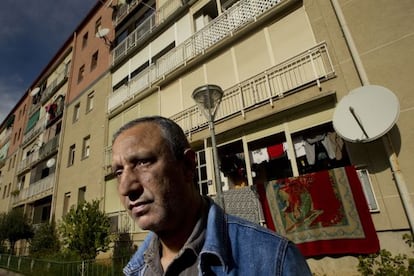Upcoming EU court ruling offers hope of shake-up of Spanish mortgages
Justices set to decide if full payment demands by banks violate EC directive

Hundreds of Spaniards and residents who have lost their homes through bank foreclosures are anxiously awaiting a European Court of Justice decision, which is expected on Thursday, that could radically change Spanish mortgage rules and benefit consumers faced with owing lenders the entire balance of their home loans.
Life could change for Rosa and her husband Julio, both Peruvians who have been living in Spain for 22 years. Currently, banks can demand full payment for the outstanding mortgage if a homeowner fails to pay just one monthly installment. This is what happened with Rosa, after she fell behind on three payments.
About two weeks ago, she received a letter from her bank demanding the full remaining 211,000 euros of the 240,000-euro loan she took out in 2006.
In January 2011, Rosa lost her job at a bill-collection agency. Three months later, her husband also lost his job as a telemarketer. They are now waiting to see whether they qualify for a suspension of payments program, but their situation could change on Thursday.
The European Court of Justice in Luxembourg is scheduled to determine whether Spanish mortgage rules violate a 1993 Unfair Terms in Consumer Contracts (93/13EEC) directive.
A Barcelona judge’s ruling in favor of Aziz was backed by legal experts in Brussels
“If the acceleration of loans [because of default] is considered an abusive practice, this would affect all claims for early due payment,” said Judge José María Fernández Seijo of Barcelona in a recent telephone interview. “If the court touches on this argument, the entire system will be jostled.”
The case in question was first filed in 2011 by Mohamed Aziz against Caixa d’Estalvis de Catalunya, Tarragona i Manresa (CatalunyaCaixa). Aziz is a Moroccan national who was evicted from his home in January 2011.
The appeal before the Court of Justice specifically addresses legal arguments regarding unfair terms in consumer contracts, particularly in mortgage loans; legal protection in enforcement proceedings; the imbalance in the parties’ rights and obligations arising under the contract; and whether the acceleration of the loan by the creditor can be enforced.
Judge Fernández Seijo’s ruling and arguments in favor of Aziz were backed and expanded by legal experts in Brussels.
Last November, Court Advocate General Juliane Kokott issued an opinion saying that the current Spanish banking “system of levying execution, [...] in which the possible grounds of objection to enforcement are limited, is incompatible with Directive 93/13/EEC, [...] where the consumer cannot obtain effective legal protection, either in the enforcement proceedings themselves or in separate judicial proceedings...”
As the government awaits the Court of Justice’s ruling, the governing Popular Party has postponed the presentation of a battery of measures in Congress aimed at slowing down the surge in home evictions and foreclosures.
“We are anxiously awaiting [this decision], which could be a push in the right direction,” said Ada Colau, a representative of the Mortgage Victims Platform (PAH) in Barcelona. “But we know that this decision isn’t going to solve the entire problem.”
Legal experts believe that the European Court of Justice won’t address any retroactivity.
“I am nervous but at the same time happy,” said Aziz, who now lives in a socially protected apartment. “I hope everything goes well for all the families who are having a rough time.”
Tu suscripción se está usando en otro dispositivo
¿Quieres añadir otro usuario a tu suscripción?
Si continúas leyendo en este dispositivo, no se podrá leer en el otro.
FlechaTu suscripción se está usando en otro dispositivo y solo puedes acceder a EL PAÍS desde un dispositivo a la vez.
Si quieres compartir tu cuenta, cambia tu suscripción a la modalidad Premium, así podrás añadir otro usuario. Cada uno accederá con su propia cuenta de email, lo que os permitirá personalizar vuestra experiencia en EL PAÍS.
¿Tienes una suscripción de empresa? Accede aquí para contratar más cuentas.
En el caso de no saber quién está usando tu cuenta, te recomendamos cambiar tu contraseña aquí.
Si decides continuar compartiendo tu cuenta, este mensaje se mostrará en tu dispositivo y en el de la otra persona que está usando tu cuenta de forma indefinida, afectando a tu experiencia de lectura. Puedes consultar aquí los términos y condiciones de la suscripción digital.








































